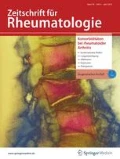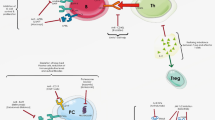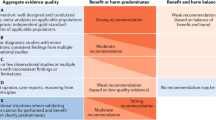Abstract
Objective
The aim of this study was to determine whether the functional chemokine receptor 5 delta32 (CCR5-Δ32) polymorphism is associated with susceptibility to systemic lupus erythematosus (SLE), vasculitis, and primary Sjogren’s syndrome (pSS).
Results
A total of 12 studies were analyzed, including 5 on SLE, 5 on vasculitis, and 2 on pSS, encompassing 1881 patients and 2391 controls. Meta-analysis indicated no association between SLE and the CCR5-Δ32 allele (OR 0.842, 95 % CI 0.793–1.804, p = 0.657), and no association between the CCR5-Δ32 allele and SLE in Europeans (OR 0.647, 95 % CI 0.306–1.368, p = 0.255). Meta-analysis of the CCR5-Δ32 allele and the Δ32Δ32 + Δ32 W genotype showed no association with lupus nephritis (LN; OR 1.771, 95 % CI 0.475–6.595, p = 0.395; OR 2.192, 95 % CI 0.182–26.42, p = 0.537, respectively). In addition, meta-analysis revealed no association between the CCR5-Δ32 allele and vasculitis in all study subjects and in Europeans (OR 1.241, 95 % CI 0.951–1.620, p = 0.111; OR 1.359, 95 % CI 0.803–2.303, p = 0.254, respectively). However, the overall OR for the CCR5-Δ32 allele was significantly higher in Kawasaki disease (KD; OR 1.746, 95 % CI 1.003–2.955, p = 0.038) and the meta-analysis of the Δ32Δ32 + Δ32 W genotype showed a trend indicating an association with KD (OR 1.683, 95 % CI 0.921–3.077, p = 0.091). No association was found between the CCR5-Δ32 polymorphism and pSS.
Conclusion
This meta-analysis demonstrates that the CCR5-Δ32 polymorphism is associated with KD, but does not facilitate susceptibility to SLE, LN, or pSS.
Zusammenfassung
Ziel
Mit der Studie sollte ermittelt werden, ob der funktionelle Chemokinrezeptor 5-Δ32(CCR5-Δ32)-Polymorphismus mit einer Suszeptibilität für den systemischen Lupus erythematosus (SLE), eine Vaskulitis oder das primäre Sjögren-Syndrom (pSS) einhergeht.
Ergebnisse
Einbezogen wurden 12 Studien, 5 zu SLE, 5 zu Vaskulitis und 2 zum pSS, mit insgesamt 1881 Patienten und 2391 Kontrollpersonen. Die Metaanalyse ergab keinen Zusammenhang zwischen SLE und dem CCR5-Δ32-Allel (OR 0,842, 95%–KI 0,793–1,804, p=0,657), auch keinen zwischen dem CCR5-Δ32-Allel und SLE bei europäischen Patienten (OR 0,647, 95%-KI 0,306–1,368, p=0,255). Ferner ergab sich keine Assoziation zwischen Lupusnephritis, dem CCR5-Δ32-Allel und Δ32Δ32+Δ32 W-Genotyp (OR 1,771, 95%-KI 0,475–6,595, p=0,395; OR 2,192, 95%–KI 0,182–26,42, p=0,537). Zusätzlich zeigte sich in der Metaanalyse keine Assoziation zwischen dem CCR5-Δ32-Allel und einer Vaskulitis bei allen Studienpatienten und bei europäischen Studienteilnehmern (OR 1,241, 95%-KI 0,951–1,620, p=0,111; OR 1,359, 95%-KI 0,803–2,303, p=0,254). Doch die Gesamt-OR für das CCR5-Δ32-Allel war signifikant höher bei Kawasaki-Syndrom-Patienten (OR 1,746, 95%-KI 1,003–2,955, p=0,038), und der Trend bei der Metaanalyse des Δ32Δ32+Δ32 W-Genotyps wies auf eine KD-Assoziation hin (OR 1,683, 95%-KI 0,921–3,077, p=0,091). Zwischen dem CCR5-Δ32-Polymporphismus und einem pSS zeigte sich keine Assoziation.
Fazit
Diese Metaanalyse weist nach, dass der CCR5-Δ32-Polymorphismus zwar mit dem Kawasaki-Syndrom assoziiert ist, nicht aber die Suszeptibilität für SLE, LN oder pSS erhöht.




Similar content being viewed by others
References
Lee YH, Nath SK (2005) Systemic lupus erythematosus susceptibility loci defined by genome scan meta-analysis. Hum Genet 118:434–443
Kang SH, Chung BH, Choi SR et al (2011) Comparison of clinical outcomes by different renal replacement therapy in patients with end-stage renal disease secondary to lupus nephritis. Korean J Intern Med 26:60–67
Fox RI (2005) Sjogren’s syndrome. Lancet 366:321–331
Lee YH, Song GG (2012) Associations between eNOS polymorphisms and susceptibility to Behcet’s disease: a meta-analysis. J Eur Acad Dermatol Venereol 26:1266–1271
Szekanecz Z, Kim J, Koch AE (2003) Chemokines and chemokine receptors in rheumatoid arthritis. Semin Immunol 15:15–21
Wu L, LaRosa G, Kassam N et al (1997) Interaction of chemokine receptor CCR5 with its ligands: multiple domains for HIV-1 gp120 binding and a single domain for chemokine binding. J Exp Med 186:1373–1381
Liu R, Paxton WA, Choe S et al (1996) Homozygous defect in HIV-1 coreceptor accounts for resistance of some multiply-exposed individuals to HIV-1 infection. Cell 86:367–377
Benkirane M, Jin DY, Chun RF et al (1997) Mechanism of transdominant inhibition of CCR5-mediated HIV-1 infection by ccr5delta32. J Biol Chem 272:30603–30606
Carvalho C, Calvisi SL, Leal B et al (2013) CCR5-Delta32: implications in SLE development. Int J Immunogenet
Schauren JS, Marasca JA, Veit TD et al (2013) CCR5delta32 in systemic lupus erythematosus: implications for disease susceptibility and outcome in a Brazilian population. Lupus 22:802–809
Aguilar F, Nunez-Roldan A, Torres B et al (2003) Chemokine receptor CCR2/CCR5 polymorphism in Spanish patients with systemic lupus erythematosus. J Rheumatol 30:1770–1774
Maier-Moore JS, Canas CA, Tobon G et al (2013) The CCR5 delta 32 polymorphism (rs333) is not associated with Sjogren’s syndrome or Type 1 Diabetes in Colombians. Clin Immunol 148:206–208
Petrek M, Cermakova Z, Hutyrova B et al (2002) CC chemokine receptor 5 and interleukin-1 receptor antagonist gene polymorphisms in patients with primary Sjogren’s syndrome. Clin Exp Rheumatol 20:701–703
Chaudhuri K, Singh Ahluwalia T, Singh S et al (2011) Polymorphism in the promoter of the CCL5 gene (CCL5G-403A) in a cohort of North Indian children with Kawasaki disease. A preliminary study. Clin Exp Rheumatol 29(Suppl 64):S126–S130
Carmona FD, Rodriguez-Rodriguez L, Castaneda S et al (2011) Role of the CCR5/Delta32CCR5 polymorphism in biopsy-proven giant cell arteritis. Hum Immunol 72:458–461
Breunis WB, Biezeveld MH, Geissler J et al (2007) Polymorphisms in chemokine receptor genes and susceptibility to Kawasaki disease. Clin Exp Immunol 150:83–90
Zhou Y, Huang D, Farver C, Hoffman GS (2003) Relative importance of CCR5 and antineutrophil cytoplasmic antibodies in patients with Wegener’s granulomatosis. J Rheumatol 30:1541–1547
Pazzola G, Boiardi L, Casali B et al (2013) CC chemokine receptor 5 polymorphism in Italian patients with giant cell arteritis. Mod Rheumatol 23:851–855
Yang SG, Ye DQ, Li XP et al (2003) The SNPs of chemokine RANTES promoter and the mutation of its’ receptor CCR5 in SLE and controls in Han indigenous in Chinese. Chin J Microbiol Immunol 23:723–727
Lee YH, Witte T, Momot T et al (2005) The mannose-binding lectin gene polymorphisms and systemic lupus erythematosus: two case-control studies and a meta-analysis. Arthritis Rheum 52:3966–3974
Nath SK, Harley JB, Lee YH (2005) Polymorphisms of complement receptor 1 and interleukin-10 genes and systemic lupus erythematosus: a meta-analysis. Hum Genet 118:225–234
Lee YH, Harley JB, Nath SK (2006) Meta-analysis of TNF-alpha promoter -308 A/G polymorphism and SLE susceptibility. Eur J Hum Genet 14:364–371
Liberati A, Altman DG, Tetzlaff J et al (2009) The PRISMA statement for reporting systematic reviews and meta-analyses of studies that evaluate health care interventions: explanation and elaboration. Ann Intern Med 151:W65–W94
Egger M, Davey Smith G, Schneider M, Minder C (1997) Bias in meta-analysis detected by a simple, graphical test. BMJ 315:629–634
Davey Smith G, Egger M (1997) Meta-analyses of randomised controlled trials. Lancet 350:1182
DerSimonian R, Laird N (1986) Meta-analysis in clinical trials. Control Clin Trials 7:177–188
Higgins JP, Thompson SG (2002) Quantifying heterogeneity in a meta-analysis. Stat Med 21:1539–1558
Mamtani M, Rovin B, Brey R et al (2008) CCL3L1 gene-containing segmental duplications and polymorphisms in CCR5 affect risk of systemic lupus erythaematosus. Ann Rheum Dis 67:1076–1083
Jhang WK, Kang MJ, Jin HS et al (2009) The CCR5 (-2135C/T) polymorphism may be associated with the development of Kawasaki disease in Korean children. J Clin Immunol 29:22–28
Bidyalaxmi Devi L, Bhatnagar A, Wanchu A, Sharma A (2013) A study on the association of autoantibodies, chemokine, and its receptor with disease activity in systemic lupus erythematosus in North Indian population. Rheumatol Int 33:2819–2826
Atzeni F, Boiardi L, Casali B et al (2012) CC chemokine receptor 5 polymorphism in Italian patients with Behcet’s disease. Rheumatology (Oxford) 51:2141–2145
Yang X, Ahmad T, Gogus F et al (2004) Analysis of the CC chemokine receptor 5 (CCR5) Delta32 polymorphism in Behcet’s disease. Eur J Immunogenet 31:11–14
Jones KL, Maguire JJ, Davenport AP (2011) Chemokine receptor CCR5: from AIDS to atherosclerosis. Br J Pharmacol 162:1453–1469
Lee YH, Rho YH, Choi SJ et al (2007) PADI4 polymorphisms and rheumatoid arthritis susceptibility: a meta-analysis. Rheumatol Int 27:827–833
Newburger JW, Fulton DR (2004) Kawasaki disease. Curr Opin Pediatr 16:508–514
Turner JE, Paust HJ, Steinmetz OM et al (2008) CCR5 deficiency aggravates crescentic glomerulonephritis in mice. J Immunol 181:6546–6556
Paxton WA, Kang S (1998) Chemokine receptor allelic polymorphisms: relationships to HIV resistance and disease progression. Semin Immunol 10:187–194
Prahalad S (2006) Negative association between the chemokine receptor CCR5-Delta32 polymorphism and rheumatoid arthritis: a meta-analysis. Genes Immun 7:264–268
Compliance with ethical guidelines
Conflict of interest. Y.H. Lee, J.-H. Kim, and G.G. Song state that there are no conflicts of interest. The accompanying manuscript does not include studies on humans or animals.
Author information
Authors and Affiliations
Corresponding author
Rights and permissions
About this article
Cite this article
Lee, Y., Kim, JH. & Song, G. Chemokine receptor 5 Δ32 polymorphism and systemic lupus erythematosus, vasculitis, and primary Sjogren’s syndrome. Z. Rheumatol. 73, 848–855 (2014). https://doi.org/10.1007/s00393-014-1356-5
Published:
Issue Date:
DOI: https://doi.org/10.1007/s00393-014-1356-5
Keywords
- Autoimmune diseases
- Mucocutaneous lymph node syndrome
- Disease susceptibility
- Genetic polymorphisms
- Publication bias




